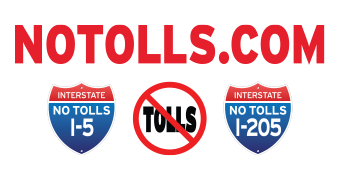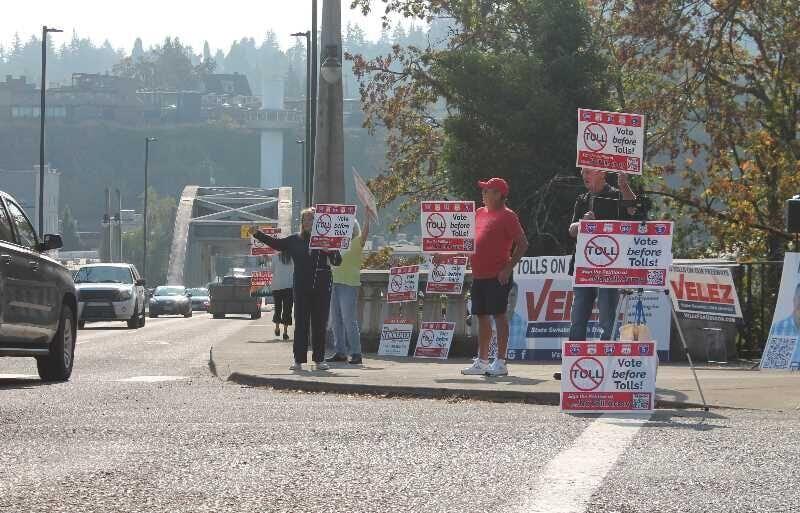Vote Before Tolls initiative aims for November 2024 ballot
By Holly Bartholomew
Canby Herald Feb 2, 2024
As the Oregon Department of Transportation plans to toll I-205 and I-5 beginning in 2026, a group of Clackamas County residents is hoping to stop the agency in its tracks.
The Vote Before Tolls initiative, which organizers are hoping to place on Oregon ballots in November, would amend the Oregon Constitution to require a majority of residents of counties within 15 miles of any road to be tolled within the state to approve of the toll in a certified election. As written, the ballot initiative would require a vote for tolls on I-5 and I-205, even though the Oregon Legislature allowed ODOT to toll those interstates with legislation passed in 2017.
To make the November ballot, the initiative also known as IP-4 needs 180,000 signatures sent to the Oregon Secretary of State’s office by July 5, though initiative author and Vote Before Tolls Chief Petitioner Dean Suhr is hoping for 200,000.
No Toll Army becomes Vote Before Tolls
Suhr, a West Linn resident, and a handful of other Clackamas County residents unhappy with ODOT’s toll proposals — and the fact that their concerns seemed to fall on deaf ears at the agency — began the initiative in 2021. It was at that time called the “No Toll Army.”
In 2022, the movement adapted to Vote Before Tolls as the organization sought to put the matter on the ballot in November 2022. Realizing they would not gather the required 180,000 signatures by then, Suhr said the group pivoted to aim for the 2024 election.
Suhr is confident that organizers will have the required signatures by the July deadline.
When the group first formed as the No Toll Army, Suhr said everyone was adamantly opposed to tolling, but as they worked with legislative counsel to craft the initiative the group realized that a voter approval for tolls was more realistic than an outright ban.
Suhr said he might even vote for a toll plan if it were equitable to all Oregonians and the money would be used efficiently.
Ultimately, the goal of the initiative is not to stop tolls entirely, Suhr said.
Rather, the Vote Before Tolls Committee wants ODOT to be more transparent with its plans.
“If they expect us to vote yes, to support this, they’re going to have to be much more forthcoming than they have,” Suhr said. “They’re just non-responsive.”
Suhr said he expects that at this time, ODOT’s toll proposals would be rejected by voters.
Last year, hoping to bypass the signature-gathering process, the Vote Before Tolls Committee worked with then state Sen. Bill Kennemer to get the Legislature to pass a resolution to put the measure before voters in 2024. Ultimately the proposal wound up stalled in committee and died during the 2023 Legislative session.
However, Suhr said he hopes to get lawmakers to revive the proposal during the upcoming 2024 short session.
Support for the petition
Since August, the Vote Before Tolls Campaign has raised over $85,000, with three of the biggest donations coming from the Oregon timber industry.
According to Suhr, more than 90% of the people approached about IP-4 end up signing it. He said he was surprised that residents in Multnomah County seemed to support the petition as much as those in Clackamas County. Assuming that a higher portion of Multnomah County inhabitants were frequent bike and MAX-riders, he thought they would be less dependent on cars and therefore less opposed to tolling.
“Multnomah County is well taxed at this point,” Suhr said. “And there are a lot of people there that are just getting by and you start adding a few hundred dollars a month in tolls, and all of a sudden they’re upside down.”
He added that Washington County is beginning to more actively oppose tolls now that ODOT is looking at tolls for Highway 217 and US 26.
Outside of the Portland metro area, people are still supportive of the initiative, Suhr said — there’s just not as much awareness about tolling in other parts of the state.
One area where the initiative has seen some resistance is the trucking industry, according to Suhr. After conversations with people in industries that rely on trucking, Suhr said some believe tolls could lessen congestion and make delivery of goods more reliable.
Suhr posits that tolls won’t actually relieve traffic congestion on routes like I-5 and I-205, particularly without the third lane on I-205 between the Abernethy Bridge and Stafford Road. ODOT recently nixed its plans to add the third lane.
Though some in the trucking industry might favor tolls, Suhr said that others, like those in the lumber industry who have donated to Vote Before Tolls, feel differently.
He said some business leaders in these areas worry about their workers not being able to afford to get to work or asking their employers to cover the costs of tolls.
A spokesperson from ODOT’s Urban Mobility Office said the agency would not challenge the ballot measure.


